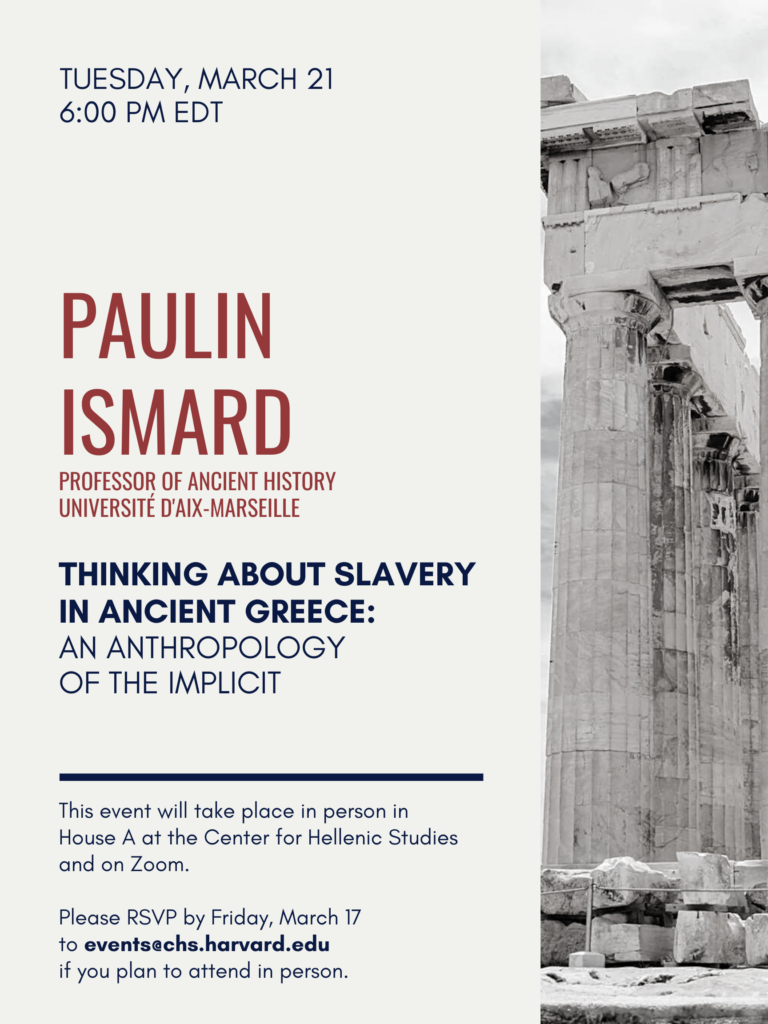Thinking About Slavery in Ancient Greece: An Anthropology of the Implicit
Paulin Ismard
Professor of Ancient History, Université d’Aix-Marseille
Date: Tuesday, March 21
Time: 6:00 p.m. EDT
Location: House A, Center for Hellenic Studies and Zoom
Please join us for a distinguished lecture by former fellow Paulin Ismard, Professor of Ancient History at Aix-Marseille University.

About the Speaker:
Paulin Ismard is Professor of Ancient Greek History at Aix-Marseille University, member of the Institut Universitaire de France. His work focuses on the history of Greek cities in the classical and hellenistic period and on the history of ancient slavery, in a comparative perspective. He has been fellow at the Center for Hellenic Studies in Washington D.C. in 2013. He is the author of : La cité des réseaux. Athènes et ses associations, VIe-Ier s. avt. J.-C. (Publications de la Sorbonne, 2010) ; L’événement Socrate (Flammarion, 2013) ; La démocratie contre les experts. Les esclaves publics en Grèce ancienne (Seuil, 2015 : Democracy’s Slaves. A political history of Ancient Greece, Harvard UP, 2017) ; La cité et ses esclaves. Institution, fictions, expériences (Seuil, 2019) ; with Vincent Azoulay, Athènes 403. Une histoire chorale(Flammarion, 2020 : Athens 403. A choral history, Cambridge UP, forthcoming). He recently edited an international collective work on the comparative history of slave societies : Les mondes de l’esclavage. Une histoire comparée (Seuil, 2021 ; Die Welten der Sklaverei, Jacoby&Stuart, 2023).
About the Lecture:
A question keeps coming up about slavery in the Greek world: how is it possible that the great thinkers of classical Athens never denounced, and even endorsed, the crime of slavery? This question, actually, makes no sense. Even if some of them recognized the universality of human reason, their « universalism » never led them to question slavery. And yet, with the exception of Politics by Aristotle, one would look in vain for a body of doctrine or a grand narrative through which ancient Greeks undertook to legitimise slavery. Slavery belonged to a category of whose existence or non-existence was not open to debate. That’s why Moses Finley arguably considered that there was no slave ideology in ancient Greece. However, it is possible to study the Greek imaginary of slavery, which comes under what I call an « anthropology of the implicit ». This is most often to be studied in the margins (or the unthought) of texts that are sometimes very well known, where slavery ceases to be an explicit topic. I will try to show this by drawing on a few texts that are too rarely studied by historians of Greek slavery (the digression of Plato’s Theaetetus, some anecdotes of the Historia of Herodotus, the Life of Aesop, the Oneirokritikon of Artemidorus of Daldis, and Aristotle’s Politics…of course).

